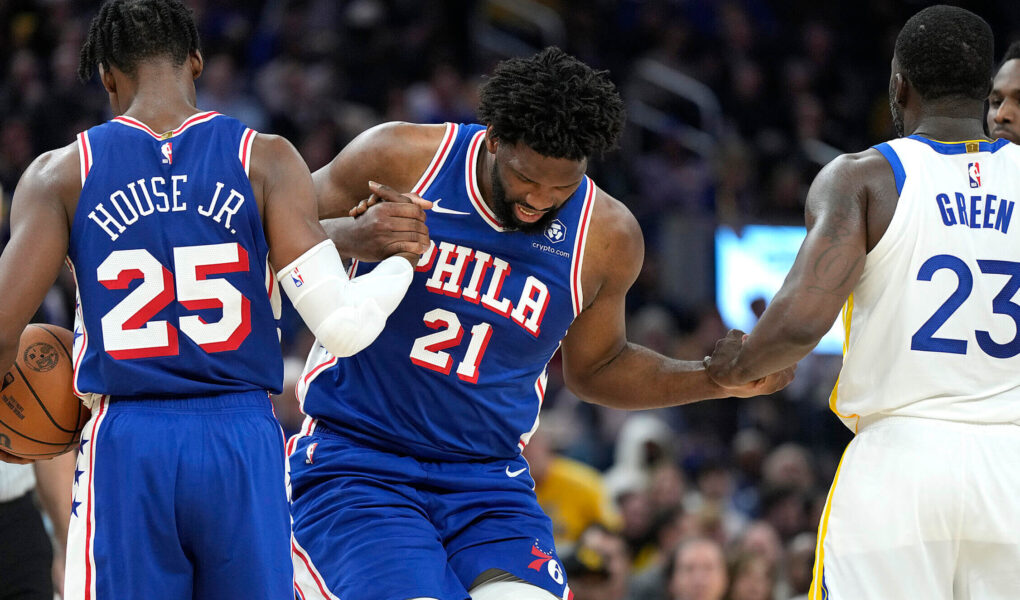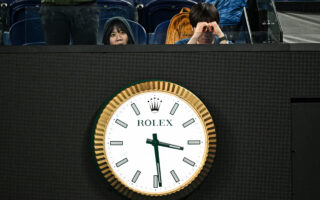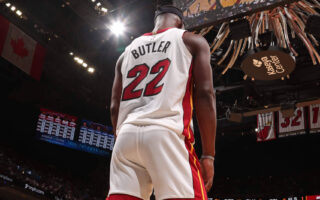SAN FRANCISCO — Joel Embiid didn’t speak.
Not with his words, anyway.
The Philadelphia 76ers big man who had been ridiculed for three days after his latest disappearance, and whose MVP defense is in such early peril because of the league’s 65-game rule that is putting so much pressure on his sensitive situation, didn’t have to say anything after he’d left the Chase Center floor in such pain late Tuesday night due to an apparent knee injury.
As was the case on Saturday afternoon, when his late scratch against the Denver Nuggets sparked a chorus of criticism about his perceived lack of willingness to take on a fellow great in Nikola Jokić, the awful optics were enough.
Only this time, in stark contrast to that Mile High City mishap, Embiid had suddenly become a sympathetic figure. And if anyone was scared, as he’d been accused of being in some high-profile media circles, it was the Sixers team (29-17) that now finds itself fifth in the Eastern Conference standings after losing 119-107 to Golden State.
It spoke volumes that Sixers coach Nick Nurse was inordinately slow to attend his postgame news conference, or that his responses to questions about the left knee injury suffered with 4 minutes, 4 seconds remaining in their fourth straight loss seemed so rehearsed. It’s never a good sign when a team’s top front office executive, in this case, the Sixers’ Daryl Morey, is making the rounds in the back hallways of the visitor’s arena in pursuit of perspective from the team’s medical staff. All of the Sixers parties who matter most were clearly concerned.
As for Embiid, he opted against speaking to reporters afterward while prioritizing an ice bath that lasted long into the night. And with good reason.
The MRI results will determine how worried these Sixers need to be as they forge ahead on this title-contending mission. For Embiid’s résumé, he can miss only five more games before being ruled ineligible for the kind of postseason awards that have shaped the legacies of greats for so long. That’s the micro of it all. The Warriors’ Jonathan Kuminga fell on Embiid’s left knee late in the game, and his night full of laborious movement mercifully ended with Warriors fans wishing him well on the way out with cheers and even a few mini-standing ovations.
But the macro, and the thing that should inspire fans and reporters alike to think twice about how we discuss this massive man who is such a basketball treasure when his body allows him to be, is that Embiid is very clearly fighting through the same sort of physical ailments that have dogged him for so much of his 10-year career.
As one Sixers source indicated late Tuesday night, he has been dealing with soreness in that same left knee all season. And while Nurse indicated that the injury that forced his late exit was somehow different from the one that had been dogging him of late, the Embiid theme remained unchanged: He was battered and bruised before February even arrived, and his ability to be at his best from here on out is suddenly in serious question again.
Did we all forget that the reigning MVP missed his first two full seasons with foot injuries, or that he has hit the hallowed 65-game mark only twice in the seven seasons in which he has played? There are shades of Yao Ming here, with the talent so transcendent but that nagging sense of physical doom and gloom always waiting around the proverbial corner.
Embiid has already accomplished far more than the 7-foot-6, 310-pound former Houston Rockets big man was able to in his nine-year career that was cut short by injuries, but the unwelcome parallels are there. Starting with the size.
You could see it long before he was hurt against the Warriors. Embiid, who missed Philadelphia’s game at Portland on Monday night, looked like a player who pushed himself to play against Golden State because the whole basketball world was screaming in his ear. There are people within the Sixers who are convinced that he played only because of all the scrutiny.
He was awful by his lofty standards, finishing with 14 points, seven rebounds and two assists while missing 13 of 18 shots and settling for jumpers on all but one attempt. Embiid has always lumbered up and down the floor, but this was a level of tentativeness and instability not often seen from him. And to hear Sixers guard Kelly Oubre discuss Embiid’s ill-fated evening afterward was to be reminded that gravity has never been his friend. While Embiid is listed at 7 feet and 280 pounds, it is widely believed that those measurements fall short of his actual size.
“(You’ve got people) pressuring him to force being great when he’s 300 pounds (and) 7 foot 5?” Oubre said while exaggerating Embiid’s height. “Like, c’mon bro. … I think this year, people will really understand that his whole career he’s been having to make sure his body’s right. This is like NASCAR, right? If their cars ain’t working, and their mechanics ain’t really able to get the job done before the race, then what can they do? They can’t race.
“This is our bodies. Our body is our car and we have to treat it with respect. He’s 350 pounds, bro. So you know, I’m praying for him for a speedy recovery, so he can come in and give himself the best chance. But at the end of the day, that’s not important. His body and his career (are) most important.”
So maybe we all should have dug a little deeper here before destroying him for his absence in Denver. Yours truly included.
There was the evidence that was largely ignored from the Thursday night game against Indiana when Embiid went down midway through the second quarter and appeared to hurt that same left knee that would be his undoing in Denver. Nonetheless, he played through it against the Pacers and finished with 31 points, seven rebounds and three assists in 31 minutes.
Fast forward two nights, and it was entirely fair to wonder why Embiid wasn’t on the injury report heading into the Nuggets game (and make no mistake, the league has been investigating that very matter). But the criticism regarding his absence went much further than that.
Embiid was deemed a coward in some circles, someone who would rather get booed (which he was) than take on Jokić in his building. Never mind that he had just bested Jokić in Philadelphia less than two weeks before.
Yet, while it’s true that Embiid hasn’t played in Denver since 2019, and that he has now missed six of their eight meetings in the Mile High City while Jokić has played every time, the context matters a great deal here. A quick recap for the sake of fairness to Embiid.
His first two Denver absences (Dec. 30, 2017, and Jan. 26, 2019) came during a time when rest was an even bigger part of his rehabilitation program. And while they were the most suspect of the six, that Embiid was still in the early days of putting together a sustained NBA run while trying to stay healthy was surely no small factor. Yet the three that preceded Saturday’s absence — with all of them coming after the last Jokić-Embiid showdown on Nov. 8, 2019 — were different enough that they deserve examining.
- March 30, 2021: Embiid had been out since March 12 with a bone bruise on his left knee, and he wouldn’t return until April 3 (two games later against Minnesota). This one is indisputably legit.
- Nov. 18, 2021: Embiid missed his sixth straight game after entering the NBA’s COVID-19 health and safety protocols. He was out from Nov. 6-27. Also legit.
- March 27, 2023: Embiid sits out with a sore right calf. He would play the game before and the game after. This one, it’s safe to say, can be up for debate.
None of which is to say that the history of Embiid not playing in Denver isn’t strange. But it’s one thing to wonder aloud why the trend has emerged, and quite another to attack the competitive character of a player who is already worthy of being deemed an all-time great. Those hot takes look cold in more ways than one now.
Ditto for the premature endorsements of the league’s 65-game rule. While fans, owners, television partners and league officials have every right to want to fix the league’s load management dilemma, the early returns here are enough to make you wonder if it might need to be revisited due to unintended consequences. Is it a good thing that the reigning MVP is on the verge of exiting that conversation before we’ve reached the All-Star break?
“I didn’t sign up for that (65-game rule),” Sixers backup center Paul Reed said of the rule that was agreed on as part of the league’s collective bargaining agreement that was ratified last April and runs through the 2029-30 season. “I don’t remember signing no paperwork, you feel me? I guess the (players’) union OK’d it. They probably didn’t have a choice though, to be honest. Yeah, it’s tough. It adds a lot of pressure to the players. We were just talking about that. A lot of pressure — especially dudes like (Embiid who are) trying to get MVP again.”
Embiid getting healthy is the only priority that matters now.
Related reading
Get The Bounce, a daily NBA Newsletter from Zach Harper and Shams Charania, in your inbox every morning. Sign up here.
(Photo: Thearon W. Henderson / Getty Images)



